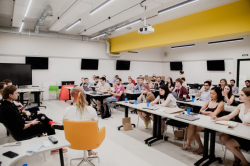Data-driven education
Many universities haven’t improved their educational programs and curricula for years. Such an approach may lead to a lack of understanding of students’ needs and doesn’t take into consideration relevant skills and knowledge that will help them become successful specialists.
A data-driven approach to education aims to solve this problem by making use of information about students in order to make substantiated decisions when creating or modifying educational programs. ITMO has been doing this for years: there are surveys for first-year students, course quality assessments once a semester, and interviews with graduates. These measures allow lecturers to know their audience and understand how to present information. Feedback helps evaluate the efficiency of the program and make it relevant for the students.
“Nowadays, education has to do with marketing and is focused on students. Before launching a course, you should approach it like a product by analyzing the audience and its demands, needs, and backgrounds. The course should satisfy the needs of students. IT is another trend in education, which includes online learning and the application of various IT tools in the creation and implementation of programs,” says Maxim Skryabin, one of the school’s heads and an education design and analytics consultant.

The Data-Driven Approach to Education Design summer school. Photo by the school's organizers
How ITMO ensures such an approach
This summer, ITMO University held the Data-Driven Approach to Education Design summer school in a hybrid format. From June 21 to 28 it took place online and in the last two days there were on-site classes at ITMO’s main campus. Introductory webinars and lectures were available to all and for an extra fee you could access additional materials and workshops, as well as receive a certificate of completion. Those who attended on-site classes received continuing professional development certificates.
“In the modern world, computer skills are a part of professional competency, so I think data collection and analysis skills will be useful not only for lecturers and professors but also methodologists and specialists who develop and implement educational programs. However, among the attendees were school teachers, who also found our classes useful,” says Ekaterina Bezyzvestnykh, one of the school’s heads and a specialist at ITMO’s Staff Support Office.

Ekaterina Bezyzvestnykh at the Data-Driven Approach to Education Design summer school. Photo by the school's organizers
Moreover, the participants could access a methodological toolset tested by ITMO: interview questions to learn more about your target audience, a checklist for course assessment, metrics for educational programs, etc. Their advantage is that they don’t require deep knowledge of computer science or math.
“Often, a lot of data is collected in educational institutions, and lecturers are usually lost in all the information. I often say that in such a situation, data is accumulated but not actually collected. Because when collecting data, there is usually a clear goal, specific tools that will be used, and a hypothesis of the expected findings,” Maxim Skryabin.
Further plans
The data-driven approach isn’t established in Russian education yet, and lecturers are only just beginning to learn about it. One of the goals of this project is to help raise awareness of the value of choosing educational methods based on data. One successful event, like this summer school, isn’t enough to achieve that.
“This autumn we plan to launch an online course for lecturers of ITMO University and external experts and by January, we will complete another intensive course. The summer school will take place every year but its topics will vary. For example, the next one will be dedicated to redesigning educational programs. It will take place in a hybrid format because on-site workshops are more valuable but at the same time, we hope to share information on the data-driven approach with as many specialists from all over the country as possible,” says Ekaterina Bezyzvestnykh.
All these projects will be implemented within a recently launched online education platform ITMO.Online. Its staff will help course authors in terms of finances, promotion, and moderation. Not only lecturers but also experts from other institutions are welcome to receive consultations from ITMO.Online’s team.

The Data-Driven Approach to Education Design summer school. Photo by the school's organizers
How to keep your course relevant and engaging
- Gather and analyze feedback from your graduates. What did they find useful in the course? What do they think could be improved? Which topics were unclear and which were most exciting?
- Get in touch with your target audience to learn their educational needs, goals, and backgrounds;
- Study job search engines, analytical reports, and statistics;
- Consult employers and industry representatives to learn about current trends;
- Analyze your competitors’ products;
- Ask your colleagues for expert advice;
- If you work at ITMO, sign up for a consultation with specialists from the Staff Support Office.





